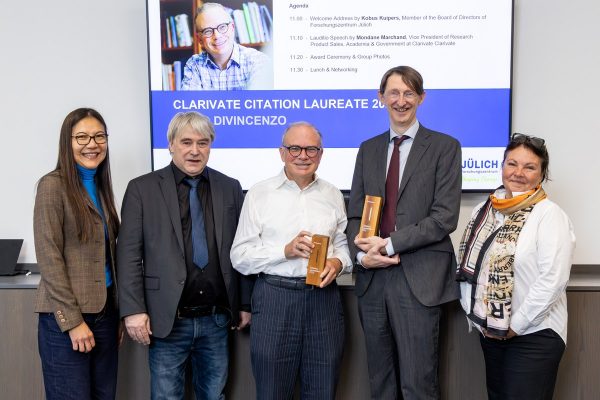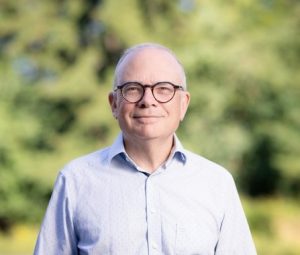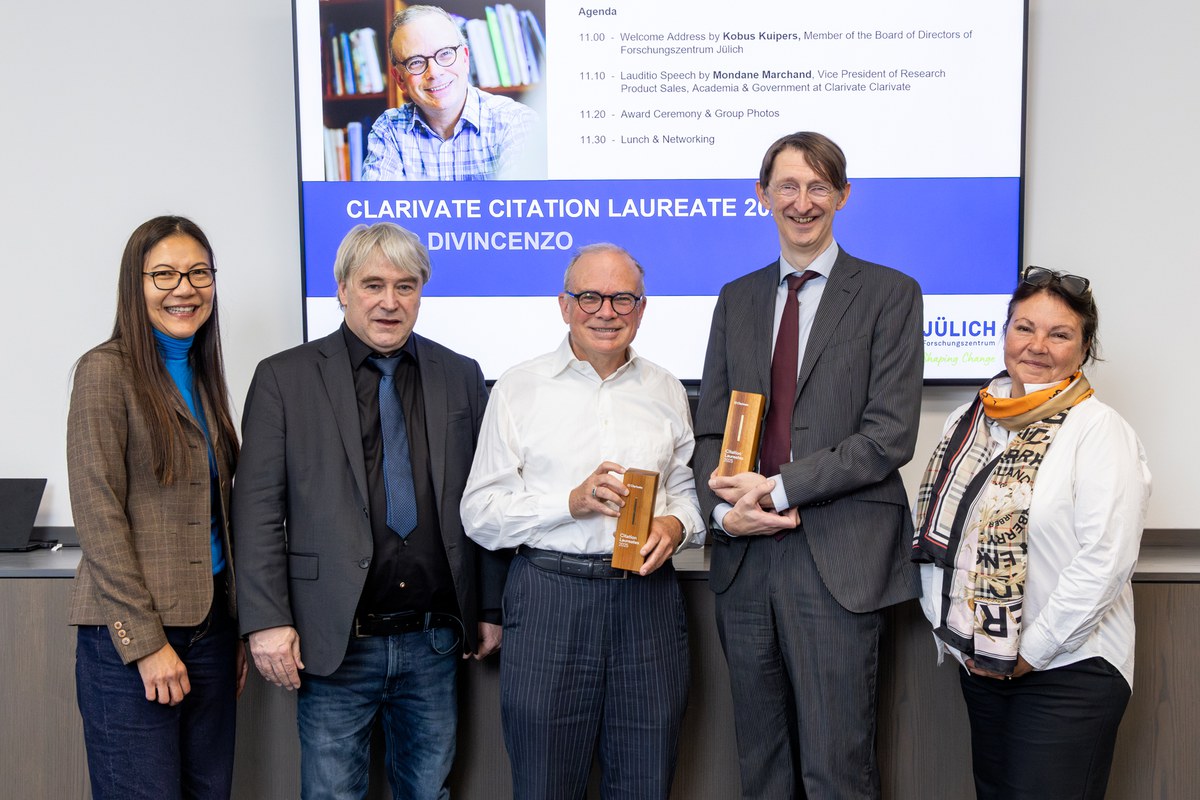Sept. 29, 2025 — Last week, scientist David DiVincenzo was honored for his research in the field of quantum computing – a century after quantum mechanics was first formulated mathematically. The Citation Laureate award is given to scientists whose publications in high-ranking journals are cited particularly frequently. DiVincenzo was Director of the Jülich Institute for Theoretical Nanoelectronics until July 2025. He received the award together with Swiss scientist Daniel Loss in the physics category.
 Helen Mei Lin Chung (from left), External Communications Clarivate, Uwe Wendland, Strategic Product Sales Manager Research & Analytics DACH and Baltics Clarivate, Prof. Dr. David DiVincenzo, Prof. Dr. Laurens Kuipers, Member of the Board of Directors Forschungszentrum Jülich, and Mondane Marchand, Vice President of Research Product Sales, Academia & Government Clarivate at the award ceremony. Credit: Forschungszentrum Jülich / Bernd Nörig.
Helen Mei Lin Chung (from left), External Communications Clarivate, Uwe Wendland, Strategic Product Sales Manager Research & Analytics DACH and Baltics Clarivate, Prof. Dr. David DiVincenzo, Prof. Dr. Laurens Kuipers, Member of the Board of Directors Forschungszentrum Jülich, and Mondane Marchand, Vice President of Research Product Sales, Academia & Government Clarivate at the award ceremony. Credit: Forschungszentrum Jülich / Bernd Nörig.
The idea of the quantum computer emerged in several places simultaneously in the early 1980s. Researchers had previously discovered that it is fundamentally impossible to simulate quantum phenomena on classical computers. Yuri Manin and Paul Benioff therefore independently came up with the idea of using the laws of quantum mechanics to calculate quantum systems. However, the concept was made famous by Nobel Prize winner Richard Feynman. He proposed simulating quantum mechanical systems with a computer based on the principles of quantum mechanics: a quantum computer.
 David DiVincenzo conducted research in Jülich for 14 years and is considered a pioneer in the field of quantum computing. Credit: Forschungszentrum Jülich / Jenö Gellinek.
David DiVincenzo conducted research in Jülich for 14 years and is considered a pioneer in the field of quantum computing. Credit: Forschungszentrum Jülich / Jenö Gellinek.
DiVincenzo became aware of this new field of research in the early 1990s. In the following years, he developed the DiVincenzo criteria, which are named after him. These criteria consist of five statements summarising the physical requirements that a quantum computer must meet. This work was pioneering at the time. “I had to unlearn some of the prejudices or narrow points of view that were offered in those times in solid state physics and open myself up to a new and more truthful way of thinking about it, which I immediately turned back and started thinking about in solid state problems,” explains DiVincenzo.
The connection between quantum information and solid-state physics is also evident in the work for which he is being honoured. Together with Daniel Loss, he developed the idea of using electron spins in quantum dots as qubits. Qubits are the computing units of a quantum computer and can be realised in different ways. One approach is to trap electrons in semiconductor structures to restrict their freedom of movement. Trapped in these so-called quantum dots, the electrons can be controlled and measured very precisely. The spin of such electrons – a type of quantum mechanical angular momentum – can then be used to carry information. Although the concept may seem abstract, it can be transferred to existing technologies. This makes it a promising platform for scalable quantum computers.
In the years that followed, DiVincenzo continued to conduct research at the IBM Watson Research Centre before being awarded the prestigious Alexander von Humboldt Professorship in 2011. He used the prize money from this science award to establish a new research group in Germany. Until the summer of 2025, the American-born scientist did research at Forschungszentrum Jülich and RWTH Aachen University, working on topics such as optimising spin qubit and superconducting qubit systems. He is a member of the US National Academy of Sciences and a fellow of the American Physical Society. And what about his plans for the future? “I do hope to continue being active as a scientist so that I won’t, in my own timeline, end after these 46 years but continue a bit longer.”
Source: Irina Heese, Forschungszentrum Jülich

